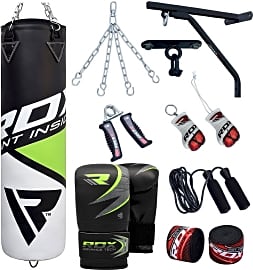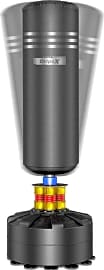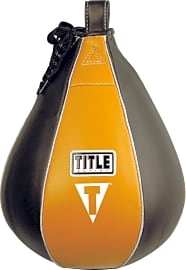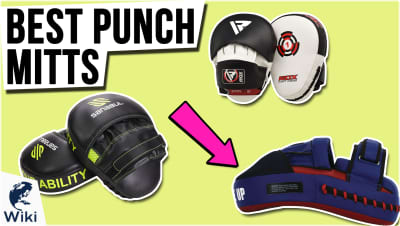The 10 Best Punching Bags

This wiki has been updated 36 times since it was first published in June of 2017. Whether you've got training to do or pent-up aggression to release, working out with one of these punching bags will help you build up your speed, power, and strengthen your sparring combinations. We've included options for boxing, as well as models designed to absorb the kicks, knees, and elbow strikes of Muay Thai training. Just be sure to put on the appropriate protective gear first. When users buy our independently chosen editorial selections, we may earn commissions to help fund the Wiki.
Editor's Notes
November 30, 2020:
For this update, we removed the Century Versys Fight Simulator, due to complaints about its lightweight design. We replaced it with another standalone model, the Dripex Freestanding.
We also removed the Everlast MMA Heavy Bag because of its problematic mounting hardware. We added another hanging model, the Outslayer MMA. This new addition comes prefilled, and its heavy-duty stitching makes this a model that will last a long time. It’s on the higher end of the price spectrum though, so if money is tight, you might want to opt for a more budget-friendly model, like the RDX MMA Training Set.
Unless you’re a professional who knows what they’re doing, you should always use hand wraps if you plan on throwing any punches at your bag. These keep the bones of your hands compact, and prevent the expansion that results in fractured bones. You’ll also want to invest in a pair of bag gloves. These are designed to be used with bags and punch mitts, unlike regular boxing gloves that are specifically made for punching your opponent.
December 12, 2019:
This round of updates, we eliminated the Outslayer Custom and the Century Tidal Wave HydroCore, due to availability issues and concerns with redundancies amongst our rankings. We also included two new options: the Fairtex Banana Bag and the Fairtex Teardrop. Fairtex is a Thai company and a well-respected name in the Muay Thai world, where many top martial artists train with their equipment.
Here’s a few details you should punch out before making a purchase in this category:
Training Goals: Punching bags come in all shapes and sizes, and the one you want is going to depend on the kind training you plan on doing. If you’re just looking build some upper-body strength and get stronger punches, you might want to consider a basic heavy bag like the Everlast MMA Heavy Bag; if you’re into muay thai or kickboxing, you might be interested in a full-length model like the Fairtex Banana Bag or the Ringside Boxing Muay Thai; if speed and coordination’s your aim, you might like a speed bag like the Title Boxing Super Speed Bag, or maybe you’ve got hands fast enough for a double end bag.
Installation: If you’re thinking of getting a speed bag, you’ll need to get a speed bag platform. If you’re considering a heavy bag, then you might want to think about a punching bag stand, but in my experience it’s always best to hang a heavy bag from something structural – if it’s possible to do so without inflicting any damage. So, if you have access to an exposed, steel I-beam in your workout area, you’ll want to think about getting one of these brackets
Pre-filling: While we endeavored to include only pre-filled heavy bags in our rankings, many companies offer their bags unfilled. The upside of buying unfilled is that the cost is significantly reduced, but the downside is that filling these bags (and doing a good job at it) is an arduous process, to say the least. By my estimation, you’d be doing yourself a favor by splurging the extra money to buy prefilled. However, if you’re looking for a budget-friendly solution to get you punching for the lowest price possible, buying unfilled is an option worth considering.
October 11, 2018:
Added more customizable options and the popular mannequin-type simulated opponent. Noted the importance of using appropriate protective gear, some of which is included with kits like the RDX MMA Training Set.
The Health Benefits Of Boxing
A tiny fraction of us fight in wars, and those wars have come to rely on predominantly technological means of combat.
There are a lot of things that we do to try to get in shape and stay healthy. Some of these techniques have developed over millennia, the result of dedicated fitness experts from the ancient world to today who’ve used themselves as guinea pigs for new moves and programs. Back then, fitness was largely associated with military prowess, as the side with the stronger individual soldiers had a distinct advantage.
Nowadays, there isn’t as much of an impetus on us to stay in shape. A tiny fraction of us fight in wars, and those wars have come to rely on predominantly technological means of combat. We certainly don’t need to hunt or forage for our meals, and more and more of us are finding work in sectors that require little more than sitting in front of a computer all day.
Some health and fitness experts have taken a look at this epidemic of laziness and sought a solution to it in those bygone days of martial strength training, with some looking even farther back in search of dietary solutions. That’s where fads like the Paleo diet and movement training** come from. But there’s one form of training that has proven successful and burning fat and building strength throughout the ages, and that’s fight training.
Boxing, in particular, offers one of the most thorough total body workouts imaginable. Fighters need to lift for strength building, while also maintaining an absurdly high level of cardiovascular fitness that demands tremendous muscle coordination and balance. As a result, boxers tend to be some of the most capable athletes on the planet, able to defend themselves, to be sure, but also able to jump into other sports and perform impressively.
Boxing is also a strategy sport. Its participants must be able to see several moves ahead and to create tactics that are capable of putting their opponent where they want them when they want them there. That makes it one of the most mentally engaging sports both to watch and to play.
So, whether you’re looking for something to help extend you time here on Earth, or you’re looking to get as buff and shredded as possible, training as a boxer can offer that to you. Even if all you do is incorporate a few elements of that regimen into your fitness routine — like attacking a punching bag or a speed bag — you’re bound to see positive results.
How To Choose The Right Punching Bag
Punching bags generally fall into one of three categories, and depending on the kind of training you're doing and the space you have available to you, one may be better suited to your needs than another.
It is advisable to use a beam if you can, however, just in case.
The most common type of punching bag is the long heavy bag designed to hang from above. This is what most people think of when they think of punching bags, as these are the kinds installed in most boxing gyms. If you own a gym that trains serious fighters, this is certainly your best bet. If you want to get a bag like this hung up in your home, you’re going to need to make sure it can be supported properly. If you simply jam a ceiling anchor up there and try to hang a heavy bag from it there’s a good chance you’ll bring the house down. Make sure you find a sturdy cross beam from which you can hang the bag, or invest in a punching bag stand, which will add some mobility to your setup.
Another popular style of punching bag is the floor-standing model. These utilize weighted bases that allow you to pummel the bag without it ever tipping over. Of course, that would make them very expensive to ship and difficult to move, which is why most models come with bases that are hollow, and that are designed to be filled with either water or sand.
One of the main advantages of a floor-standing punching bag is its mobility. If you want to rearrange your training area to accommodate new pieces of equipment, you don’t need to uninstall your bag chains and find a new place to hang it up. It also isn’t dependent on the placement of your cross beams for stability. On the downside, the stiffness of a floor-standing model — especially when compared to the movement of a heavy bag — inspires a little less footwork in the trainee. Floor-standing models also require the purchase of sand, or at least the hassle of filling up their bases.
Then, of course there is the speed bag. This presents boxers with a totally different workout, putting additional stress on the shoulder muscles and building up that all-important sense of timing. These hang from the ceiling, and are light enough to do so with simple anchors, regardless of the placement of cross beams. It is advisable to use a beam if you can, however, just in case.
Other Essential Boxing Accessories
Once you’ve got your punching bag or bags all set up and ready for you to start training, you can’t just pummel them with your bare fists. Boxing is a sport that requires a fair amount of accessories to be performed properly, and both tape and gloves are essential. These tools will help protect your fingers, hands, and wrists from unwanted jams and breaks that result from your hits against a bag or opponent. In the case of the gloves, they also minimize a little bit of the structural damage that a bare fist would cause to your opponent's face.
In order to build up your cardio health and prepare you for the intense legwork that boxing requires, you’re going to want a good jump rope. This is the classic tool of the training boxer, and for good reason. Like the sport itself, jump rope demands speed, endurance, timing, and coordination.
Of course, if all else fails, you could always do what Rocky did and befriend a butcher who will let you tenderize enormous sides of beef in a downtown Philadelphia refrigerator.















